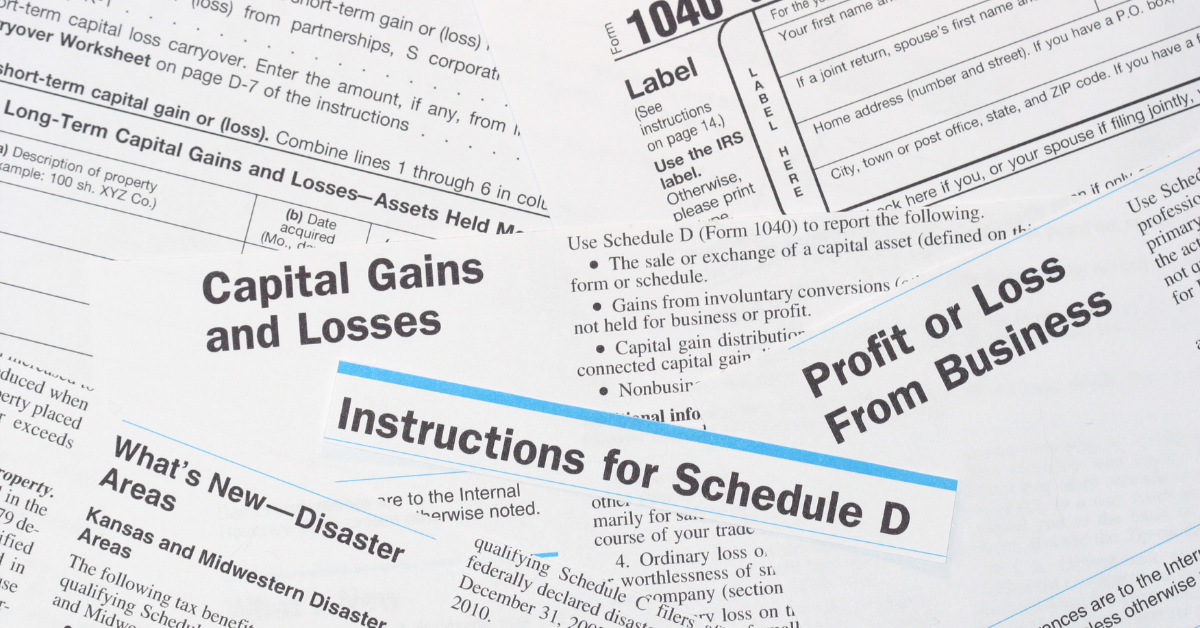What Are Capital Gains and Capital Assets?
December 3, 2021
What Are Capital Gains and Capital Assets?
December 3, 2021
Share this post:
Last updated: 2/29/2024

Understanding capital gains, losses, and assets are important to your overall financial strategy. Asset appreciation, like from your stocks or real estate, is exciting, especially when you sell for a profit, but don’t forget that Uncle Sam wants his cut, too.
What Are Capital Gains and Capital Assets?
To discuss capital gains, we must first touch on capital assets. Capital assets are property or items owned, like real estate, cars, businesses, stocks, bonds, collectibles, and other valuable possessions. A capital gain is an appreciation in the value of a capital asset, realized upon the sale of that asset (i.e., you sold the asset for more than you paid for it). The price you paid for the asset (which includes the purchase price and any commissions and fees less depreciation of the asset) is considered your cost basis.
Capital gains are only taxed when you sell the asset (i.e., “realize” the gain). Capital gains can be either short-term (one year or less) or long-term (more than one year) and are considered taxable on the federal level and state level if your state imposes income taxes. Capital gains must be claimed on your tax return. Short-term capital gains are assets held for one year or less and are taxed as ordinary income based on your adjusted gross income—meaning they can move you into higher income tax brackets. Long-term capital gains are those held for one year or more and have a special lower tax rate. Let’s use an example to illustrate this.
Let’s say you had a windfall; you inherited money from a grandparent and bought 10,000 shares of Apple stock on May 18th, 2021, when the stock price was $124.85, for a total of $1,248,500. You want to sell the stock today (as of this article’s writing on 11/17/21, Apple’s stock price is $153.97/share) for a total of $1,539,700. You’ve realized a short-term capital gain of $291,200 and will have to pay income taxes in a higher tax bracket as if this were your ordinary income. If your annual salary is $86,375, you will pay approximately $124,653 total in state and federal capital gains taxes. Almost HALF of the total capital gains you realized will go to Uncle Sam.
Now, let’s say you bought 10,0000 shares of Apple stock on 8/28/20 for $124.81/share for a total price of $1,248,100. You want to sell all your shares of this stock today (as of this article’s writing on 11/17/21, Apple’s stock price is $153.97/share) for a total of $1,539,700. By holding this stock for 1+ years, you’ll pay approximately $78,364 in capital gains taxes—almost $50,000 less than the short-term capital gain tax above.
You can estimate your capital gains taxes here using Smart Asset’s capital gains tax calculator. The tax code can and does change; you can find the current capital gains tax rate on the IRS’s website here. According to the IRS’s website, “The tax rate on most net capital gain is no higher than 15% for most individuals. Some or all net capital gain may be taxed at 0% if your taxable income is less than $44,625. A capital gain rate of 15% applies if your taxable income is more than $44,625 but less than or equal to $492,300 for single; more than $44,625 but less than or equal to $276,900 for married filing separately; more than $89,250 but less than or equal to $553,850 for married filing jointly and qualifying surviving spouse, or more than $59,750 but less than or equal to $523,050 for head of household. However, a net capital gain tax rate of 20% applies to the extent that your taxable income exceeds the thresholds set for the 15% capital gain rate.
There are a few other exceptions where capital gains may be taxed at rates greater than 20%:
- The taxable part of a gain from selling section 1202 qualified small business stock is taxed at a maximum 28% rate.
- Net capital gains from selling collectibles (such as coins or art) are taxed at a maximum 28% rate.
- The portion of any unrecaptured section 1250 gain from selling section 1250 real property is taxed at a maximum 25% rate.”
High earners (single filers earning more than $200,000 per year and joint filers earning over $250,000) may also owe a tax called the net investment income tax (NIIT). This imposes an extra 3.8% tax on all capital gains.
Additionally, inherited assets or assets received as a gift have different capital gains tax considerations. According to brookings.edu, “capital gains taxes on accrued capital gains are forgiven if the asset holder dies—the so-called ‘Angel of Death’ loophole. The basis of an asset left to an heir is ‘stepped up’ to the asset’s current value. Here’s an example: if your uncle bought an asset for $100 and sold it the day before he died at $300, he would owe capital gains tax on the $200 gain. If, instead, he held onto the asset until death and bequeathed it to you, you would receive the asset with a new basis of $300, not $100. No tax on the $200 capital gain is ever paid. If you eventually sell the asset for $350, you would have a basis of $300 and hence pay tax on capital gains of $50.” Inherited assets automatically become long term, no matter how long the original owner held them.

How to Minimize Your Capital Gains Taxes
Considering your tax rates is an important factor when making investment and sales decisions. Here are some ways to minimize your capital gains taxes:
- When possible, holding an asset subject to capital gains for longer than a year can significantly lower your taxes due when sold.
- Proceeds from a home sale can be excluded if certain conditions are met: 1) you must have lived in the home as your primary residence for two of the five years before you sell it, and 2) you must not have excluded another home in the two years before the home sale. You can exclude up to $250,000 in gains from a home sale if you’re a single filer and up to $500,000 if you’re married and filing jointly.
- Invest dividends into underperforming stocks; this allows you to hold on to your high-performing stocks and avoid the capital gains taxes you would have to pay if you sold them.
- Use your tax-advantaged retirement accounts to allow your investments to grow tax-free or tax-deferred. This also allows you to sell within the accounts without having to pay capital gains taxes as long as you wait to withdraw funds until retirement age. Additionally, qualified distributions from 529 plans and Roth IRAs are tax-free—no taxable event occurs on your investment earnings.
- Use capital losses to your advantage. The IRS allows you to deduct a certain amount of capital losses every year on your tax return and carry over the excess into future years indefinitely until you’ve exhausted the total capital loss value. This can help offset any capital gains you’ve incurred each year.
- Work with a financial team, including a CPA, who often uses tax-efficient strategies while managing your investments and can advise on tax laws and strategies to maximize growth.

To report capital gains and losses effectively, it’s important to keep good records, including what you’ve bought and sold and when and your cost basis.
If you want to learn about more personalized and advanced strategies, schedule a 15-minute call with our team.
Schedule Your Complimentary 15-Minute Call
Want expert retirement and investing advice? Subscribe to our YouTube channel and check out our weekly podcast with The Sandman!
Listen to Protect Your Assets anywhere you get your podcasts:
Standard Disclosure
This blog expresses the author’s views as of the date indicated, are subject to change without notice, and may not be updated. The information contained within is believed to be from reliable sources. However, its accurateness, completeness, and the opinions based thereon by the author are not guaranteed – no responsibility is assumed for omissions or errors. This blog aims to expose you to ideas and financial vehicles that may help you work towards your financial goals. No promises or guarantees are made that you will accomplish such goals. Past performance is no guarantee of future results, and any expected returns or hypothetical projections may not reflect actual future performance or outcomes. All investments involve risk and may lose money. Nothing in this document should be construed as investment, tax, financial, accounting, or legal advice. Each prospective investor must evaluate and investigate any investments considered or any investment strategies or recommendations described herein (including the risks and merits thereof), seek professional advice for their particular circumstances, and inform themselves about the tax or other consequences of any investments or services considered. Investment advisory services are offered through Liberty Wealth Management, LLC (“LWM”), DBA Liberty Group, an SEC-registered investment adviser. For additional information on LWM or its investment professionals, please visit www.adviserinfo.sec.gov or contact us directly at 411 30th Street, 2nd Floor, Oakland, CA 94609, T: 510-658-1880, F: 510-658-1886, www.libertygroupllc.com. Registration with the U.S. Securities and Exchange Commission or any state securities authority does not imply a certain level of skill or training.
References
Berry-Johnson, Janet. (2020, December 1). Capital gains are the profits you make from selling your investments, and they can be taxed at lower rates. Business Insider. https://www.businessinsider.com/what-are-capital-gains
Chen, James. (2021, September 7). Capital Gain. Investopedia. https://www.investopedia.com/terms/c/capitalgain.asp
Enda, Grace, & Gale, William. (2020, February 14). What are capital gains taxes and how could they be reformed? Brookings.edu. https://www.brookings.edu/policy2020/votervital/what-are-capital-gains-taxes-and-how-could-they-be-reformed/
IRS. (2021, November 4). Topic No. 409 Capital Gains and Losses. https://www.irs.gov/taxtopics/tc409
Kiernan, Kaitlyn. (2017, September 19). Capital Gains Explained. FINRA. https://www.finra.org/investors/insights/capital-gains-explained
Orem, Tina, & Parys, Sabrina. (2021, November 21). 2021–2022 Capital Gains Tax Rates — and How to Calculate Your Bill. NerdWallet. https://www.nerdwallet.com/article/taxes/capital-gains-tax-rates
Royal, James. (2021, November 11). What is the long-term capital gains tax? Bankrate. https://www.bankrate.com/investing/long-term-capital-gains-tax/
